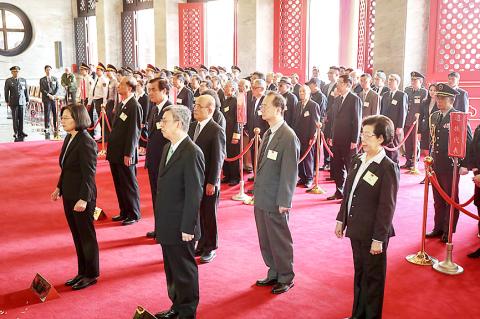Vice President Chen Chien-jen (陳建仁) yesterday announced that he would not be President Tsai Ing-wen’s (蔡英文) running mate in next year’s presidential election, adding that it was the “best decision” he could make for the president and the nation.
In an open letter on Facebook, Chen said that by next year he would have completed what he had signed up for when he agreed to join the Tsai administration almost four years ago.
To help the Democratic Progressive Party (DPP) remain in power, ensure the survival of Taiwan’s sovereignty and transform the economy, the party needs to unite to give Tsai its support, he said.

Photo: CNA
It has been a pleasure to take on the responsibility of reform, which has not been an easy path, but the criticism the DPP has faced in the more than three years since it won power were a necessary price to pay for reform, he said.
He entered politics to be the humblest of civil servants, so that Taiwan could become a better nation and people could have better lives, he added.
Chen said he hopes the public would cherish Tsai, who has always been “brave in doing the right thing,” and that the DPP would have the wisdom to make the correct decisions to keep Taiwan a free, democratic, prosperous and strong nation.
Although he would assume a different role, his thoughts would remain with the party, he said, adding that he had informed Tsai of his decision.
Chen’s announcement has reportedly raised anticipation among DPP members of a Tsai-Lai ticket, after former premier William Lai (賴清德) on Monday last week also registered for the party’s presidential primary.
Tsai, who also registered for the party’s primary last week, expressed her gratitude to Chen on Facebook, adding that she was impressed that his decision was made for the sake of party unity.
Several DPP lawmakers yesterday said the party has the best prospect of winning next year’s presidential election with a Tsai-Lai ticket.
DPP Legislator Chen Ming-wen (陳明文) said that Chen Chien-jen’s move paved the way for a Tsai-Lai ticket and applauded his decision at this “critical juncture.”
DPP Legislator Tsai Shih-ying (蔡適應) said that a Tsai-Chen Chien-jen ticket is not yet impossible, as the outcome would ultimately depend on the decision of each candidate.
DPP Legislator Wang Ting-yu (王定宇) praised Chen Chien-jen’s “selfless” move, saying that it was meant to facilitate coordination among the party’s presidential hopefuls.
However, DPP Legislator Kuo Kuo-wen (郭國文), who has openly expressed his support for Lai, said that Lai is unlikely to drop out of the primary, as he has a strong sense of responsibility and his supporters would not approve of such a move.

MAKING WAVES: China’s maritime militia could become a nontraditional threat in war, clogging up shipping lanes to prevent US or Japanese intervention, a report said About 1,900 Chinese ships flying flags of convenience and fishing vessels that participated in China’s military exercises around Taiwan last month and in January last year have been listed for monitoring, Coast Guard Administration (CGA) Deputy Director-General Hsieh Ching-chin (謝慶欽) said yesterday. Following amendments to the Commercial Port Act (商港法) and the Law of Ships (船舶法) last month, the CGA can designate possible berthing areas or deny ports of call for vessels suspected of loitering around areas where undersea cables can be accessed, Oceans Affairs Council Minister Kuan Bi-ling (管碧玲) said. The list of suspected ships, originally 300, had risen to about

DAREDEVIL: Honnold said it had always been a dream of his to climb Taipei 101, while a Netflix producer said the skyscraper was ‘a real icon of this country’ US climber Alex Honnold yesterday took on Taiwan’s tallest building, becoming the first person to scale Taipei 101 without a rope, harness or safety net. Hundreds of spectators gathered at the base of the 101-story skyscraper to watch Honnold, 40, embark on his daredevil feat, which was also broadcast live on Netflix. Dressed in a red T-shirt and yellow custom-made climbing shoes, Honnold swiftly moved up the southeast face of the glass and steel building. At one point, he stepped onto a platform midway up to wave down at fans and onlookers who were taking photos. People watching from inside

Japan’s strategic alliance with the US would collapse if Tokyo were to turn away from a conflict in Taiwan, Japanese Prime Minister Sanae Takaichi said yesterday, but distanced herself from previous comments that suggested a possible military response in such an event. Takaichi expressed her latest views on a nationally broadcast TV program late on Monday, where an opposition party leader criticized her for igniting tensions with China with the earlier remarks. Ties between Japan and China have sunk to the worst level in years after Takaichi said in November that a hypothetical Chinese attack on Taiwan could bring about a Japanese

The WHO ignored early COVID-19 warnings from Taiwan, US Deputy Secretary of Health and Human Services Jim O’Neill said on Friday, as part of justification for Washington withdrawing from the global health body. US Secretary of State Marco Rubio on Thursday said that the US was pulling out of the UN agency, as it failed to fulfill its responsibilities during the COVID-19 pandemic. The WHO “ignored early COVID warnings from Taiwan in 2019 by pretending Taiwan did not exist, O’Neill wrote on X on Friday, Taiwan time. “It ignored rigorous science and promoted lockdowns.” The US will “continue international coordination on infectious